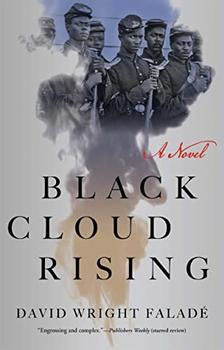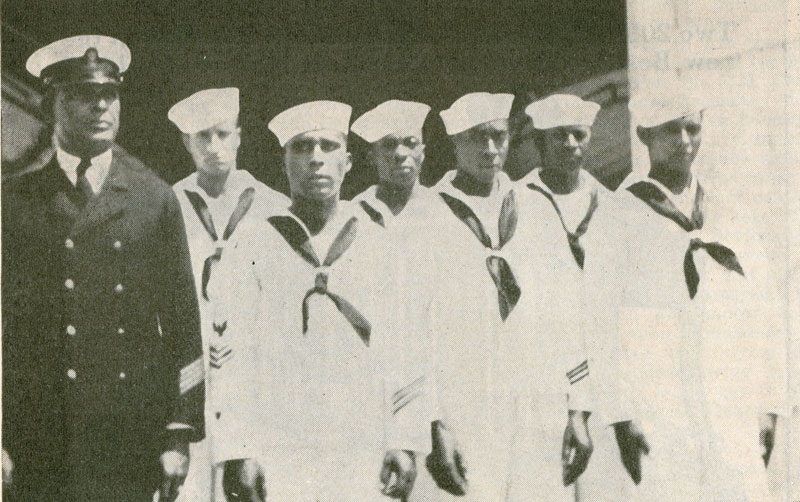Summary | Excerpt | Reading Guide | Reviews | Beyond the Book | Read-Alikes | Genres & Themes | Author Bio

This article relates to Black Cloud Rising
 In Black Cloud Rising, David Wright Faladé introduces a true and fascinating historical figure in Sergeant Richard Etheridge. Born in 1842 along the shores of North Carolina's Roanoke Island, Etheridge was raised as the property of John B. Etheridge until the Civil War and emancipation ended his physical oppression. As the Union military pushed deeper into Virginia and North Carolina in late 1863, efforts at enlisting freed African American slaves to fight for the Union attracted young Etheridge. He enlisted in the 2nd North Carolina Colored Volunteers (reorganized in 1864 as the 36th United States Colored Infantry) and was appointed a sergeant of Company F, serving for nearly three years. But it was only after the Civil War ended that Etheridge's claim to fame would emerge.
In Black Cloud Rising, David Wright Faladé introduces a true and fascinating historical figure in Sergeant Richard Etheridge. Born in 1842 along the shores of North Carolina's Roanoke Island, Etheridge was raised as the property of John B. Etheridge until the Civil War and emancipation ended his physical oppression. As the Union military pushed deeper into Virginia and North Carolina in late 1863, efforts at enlisting freed African American slaves to fight for the Union attracted young Etheridge. He enlisted in the 2nd North Carolina Colored Volunteers (reorganized in 1864 as the 36th United States Colored Infantry) and was appointed a sergeant of Company F, serving for nearly three years. But it was only after the Civil War ended that Etheridge's claim to fame would emerge.
Like most natives of North Carolina's Outer Banks, Etheridge was well-schooled in the ways of the sea, and after he returned home in 1865, he made a living fishing and piloting boats. By 1875, he decided to reenter a life of service, this time joining the United States Life-Saving Service (an early precursor to the U.S. Coast Guard). Stationed first at Bodie Island, Etheridge held the lowest ranking position (the number six surfman) on a racially mixed crew of six. But he had bigger plans. As a writer for Our State magazine put it, "he drilled with the equipment, studied USLSS regulations and procedures, and took part in the round-the-clock beach patrols. Knowing he needed to work harder than his white counterparts, he drove himself and became known as one of the better surfmen on the Banks."
This recognition soon brought Etheridge recommendation for promotion and, in 1880, he became the first African American commander of Pea Island Life-Saving Station 17. Known as a "keeper," the commander of a station was tasked with the training and oversight of his surfmen. Upon his elevation to keeper at Station 17, four of the white surfmen quit. Etheridge promptly hired African American surfmen to replace them, making his command the first all-Black crew in Life-Saving Station history. Sadly, arsonists burned down the station just months later, but Etheridge was undeterred. Under his supervision, a new station was built on the original site. Using his military discipline, he ran his crew through rigorous drills to hone their lifesaving skills, which earned the station its reputation as "one of the tautest on the Carolina Coast."
On October 11, 1896, the Pea Island crew conducted a daring and physically courageous rescue of the E.S. Newman, a three-masted schooner that foundered two miles south of the station during a storm. Sighting the ship's flare, Etheridge and crew dispatched to the scene and did the seemingly impossible, according to the U.S. Coast Guard's account:
"The daring, quick-witted Etheridge tied two of his strongest surfmen together and connected them to shore by a long line. They fought their way through the roaring breakers and finally reached the schooner. The seemingly inexhaustible Pea Island crewmembers journeyed through the perilous waters ten times and rescued the entire crew of the E.S. Newman."
After the weather cleared, the keeper, his crew, and the Newman's captain walked the beach near the wreckage to see what was salvageable. The nameplate of the ship had washed ashore, and the captain presented it to the Station 17 surfmen as a token of his gratitude. This would be the only recognition Etheridge and his crew would have for the next 100 years until, in 1996, the U.S. Coast Guard posthumously awarded the Gold Lifesaving Medal to Keeper Richard Etheridge and the Station 17 surfmen. This award is the service's highest peacetime honor. Etheridge died on duty, the keeper of his station, in May 1900 at the age of 58.
Wright Faladé, the author of Black Cloud Rising, chronicles Etheridge's maritime heroics in his nonfiction history Fire on the Beach: Recovering the Lost Story of Richard Etheridge and the Pea Island Lifesavers, co-authored with David Zoby. The quiet life of service that Etheridge lived should rightfully be known by many more people, and with both books, the hope is more will remember a great man and American.
Richard Etheridge and the Pea Island crew, courtesy of Wikimedia Commons
Filed under People, Eras & Events
![]() This "beyond the book article" relates to Black Cloud Rising. It originally ran in February 2022 and has been updated for the
February 2023 paperback edition.
Go to magazine.
This "beyond the book article" relates to Black Cloud Rising. It originally ran in February 2022 and has been updated for the
February 2023 paperback edition.
Go to magazine.
Being slightly paranoid is like being slightly pregnant – it tends to get worse.
Click Here to find out who said this, as well as discovering other famous literary quotes!
Your guide toexceptional books
BookBrowse seeks out and recommends the best in contemporary fiction and nonfiction—books that not only engage and entertain but also deepen our understanding of ourselves and the world around us.